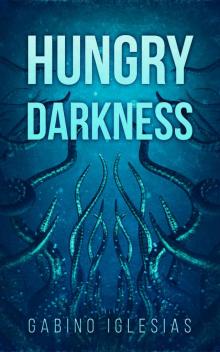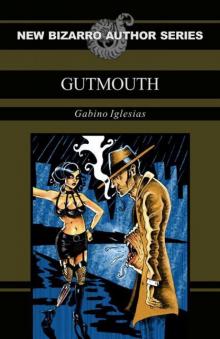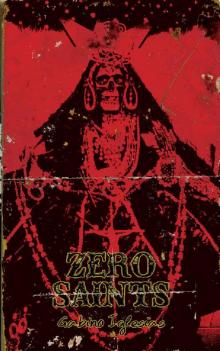- Home
- Gabino Iglesias
Both Sides Page 3
Both Sides Read online
Page 3
The rhythms of the freeway and the traveling shadows that shifted across the bus’s interior soothed Rogelio. Before drifting into an unavoidable slumber, the boy remembered his father’s favorite dicho when things got difficult: A mí la muerte me pela los dientes. When he first heard his father say this, the boy had wondered why would Death peel anyone’s teeth? And could teeth even be peeled? But as he now capitulated to inevitable sleep, Rogelio believed he finally understood that old Mexican saying.
“Marisol and Rogelio Acosta!”
Rogelio’s eyes popped open at the bus driver’s announcement of their names on the intercom. His sister was already zipping up her backpack. Rogelio figured Marisol must have been awake, reading a book with her mini-reading light. His sister loved poetry and novels and short stories. That’s why Marisol did so well in high school, their mother often said. Loving books will lead to success in life. Rogelio preferred to entertain himself with video games when he couldn’t be outside playing basketball or soccer. But he hoped that someday he’d like to read books as much as his sister did, and maybe then he’d get better grades.
“We’re here,” Marisol whispered. “At tía Isabel’s house.”
Rogelio looked out the window and saw his aunt standing in her driveway. She looked so much like his mother, even though tía Isabel was eight years older than her sister, Alma. In fact, there was a time—when Alma was in her mid-twenties and Isabel in her early thirties—that many who met them thought the sisters were identical twins. Sometimes, at family gatherings, whether in Chula Vista with Alma and her family, or here in Los Angeles with Isabel and hers, the sisters would sometimes play along with the confused neighbors who had been invited over to celebrate.
And despite the 127 mile distance between Los Angeles and Chula Vista, the sisters’ families remained close. In fact, Rogelio knew his tía Isabel well because he had interviewed her for an oral history project last year. He had learned that, with the cunning and expensive assistance of a coyote, Isabel and their now late mother, Abuelita Belén, had come to the United States seven years before the infant Alma and their father could. And for this simple accident of timing, Rogelio’s aunt and grandmother had become United States citizens under President Reagan’s 1986 Immigration Reform and Control Act. Tía Isabel did well in school, and majored in Business Administration at San Diego State University, then landed her first job in Los Angeles working the registration desk at the Double Tree in downtown. Now, Tía Isabel was the Hotel Revenue Manager at the Courtyard Marriott near LAX. At age fifty, she looked years younger, her actual age—betrayed only by a streak of white hair that ran from her the top of her forehead that she brushed back over an otherwise full, black head of hair. The women on that side of the family kept their youth, Rogelio’s father, Alejandro, often said. Good skin, great hair, nice teeth. Alma would always add: And we’re smart, too.”
Yes, Tía Isabel was healthy, but her late husband, Tío Manny, had suffered from Type 2 Diabetes for years, and survived three strokes before a heart attack took him on Christmas Day, 2016. Rogelio’s father said that it was really the election that killed Manny, but Rogelio couldn’t figure how an election, even that one, could cause a heart to stop. A few years after Manny passed away, Tía Isabel’s son, Mateo came down from Sacramento where he had earned a master’s in English literature at UC Davis. He didn’t want his mother to be alone, and he could easily find a teaching gig at a high school in Los Angeles. Mateo didn’t need much to live, just enough to keep himself clothed and fed while he worked on a novel. He moved into the small house that stood in the large backyard Abuelita Belén had enjoyed as her haven. But it had been vacant since her death, so, in many ways, it was a perfect way to make use of it again. Mateo saved money on rent and helped his mother stave off sadness and loss. He quickly found a teaching job at Cathedral High School. “Not a big paycheck, but enough to keep body and soul together,” Mateo liked to say, “while I write the Great American Novel.” But his mother knew he had sacrificed the full life he had fashioned up in Sacramento to help her with the loneliness widowhood had brought. Though young when she had Mateo, Isabel could not conceive again. “Quality not quantity,” Mateo joked whenever his mother fell into a funk because she could not give him at least one sibling. And he’d add: “And that way, I have you all to myself.”
Rogelio and Marisol stepped off the bus. The night had gotten very cold. The crickets chirped loudly. Tía Isabel opened her arms wide and said, “Come here, my babies.”
Rogelio and Marisol had settled into a comfortable—if not wholly normal—routine in the month they had been living their new lives with Tía Isabel and Mateo. The house had been built in 1933 in a part of northeast Los Angeles that was just six miles from downtown, in an area known as Glassell Park near Eagle Rock and Highland Park and Mount Washington. These communities had undergone some of the most aggressive gentrification over the last fifteen years, and her modest, 1,450 square-foot home was now worth well over a million dollars, at least according to Zillow and Redfin. But Isabel would never sell. She and her late husband had toiled for the down payment when they were newly married, and it held too many memories. And now that her niece and nephew were liv with her, Isabel needed the house more than ever. She had converted the study of her wood-framed home back into the bedroom it had been when Mateo was young. Isabel furnished it with sturdy bunk beds, two dressers, and two small desks that she bought at Ikea. She knew that she could never replace their parents, but at least she could make it as comfortable as possible.
Marisol enrolled as a high school senior at the Sotomayor Learning Academies on North San Fernando Road, a short drive away. Rogelio enrolled at the same campus, but in the middle school program. Because he had been identified on the enrollment form as one of the relocated children, the school granted a waiver so that he could enter the sixth grade early to be on the same campus as his sister. “Small kindnesses,” his aunt has said when the waiver was approved. Each morning, Mateo would drop off his cousins at school and then head to his teaching job at Cathedral High School. The children would then stay on campus doing schoolwork or attending club meetings until 6:30 p.m. when Isabel would drive onto campus and gather them up for dinner. Structure. Activities. Near normalcy.
And part of that normalcy was the once weekly, government-sanctioned—and monitored—video call with their parents. Each Sunday night, Isabel would set up her laptop at the kitchen table for Rogelio and Marisol, click on to the Homeland Security-approved link, type in her family password and code, and connect with her sister and brother-in-law who sat 1,576 miles away in a small apartment in Ocotlán, Jalisco, their hometown about 150 miles south east of Guadalajara. They were allowed fifteen minutes each week to gaze upon each other and share as many bits of news about themselves as could be shared in that short time. Since all cellphone and internet connections to all Latin-American countries had been blocked by Homeland Security under Executive Order 9066, they were forced to savor each of these minutes. At the end of the video calls, Rogelio’s mother would always break down in tears, and his father would valiantly try to comfort her as tears fell freely from his own eyes. The one thing that kept their parents sane was knowing that the children were in safe hands and clearly thriving despite the pain of separation. And so this was the new normal: Parents on a computer screen, fifteen minutes a week.
Rogelio had his suspicions about Marisol.
At first, he thought he was dreaming what was happening. But one night, as the glowing alarm clock numbers read 11:02 p.m., Rogelio forced himself stay awake while pretending to sleep—complete with fake snores—as he waited in his perch on the upper bunk. Marisol whispered: “Are you awake?” The boy did not answer. Then after a minute, Marisol slowly got out of bed. Even in the shadows, Rogelio could see that his sister was fully dressed in a sweatshirt and jeans. She slipped on a pair of sneakers, grabbed her backpack, and gingerly opened the window. Within a few seconds she was outside standing in the flowerb
ed. Marisol closed the window and was gone.
Rogelio blinked in disbelief. He heard a car start up—he thought it sounded like Mateo’s battered Honda Civic that was always parked out front—then a car door opened and closed, followed by the sound of the engine revving then slowly making its way down the street. As the last sounds of the car disappeared, fatigue overcame Rogelio, and his fake snores soon became real. His final thought was that he would confront Marisol and Mateo in the morning as they drove to school. Rogelio had no choice.
Los caminos de la vida.
“Put it louder,” said Marisol, even though she could have reached over and done it herself.
But Mateo complied and pushed the volume control on his steering wheel. Marisol sat in the front passenger seat and bobbed her head to the song. Rogelio thought it was funny how his sister had gotten into a habit of exploring their aunt’s vast CD collection. So old school. Fortunately, Mateo’s ancient Honda had its original CD player, so Marisol could bring the music with her on the rides to school. Lila Downs had become Marisol’s musical crush of the week. Rogelio’s Spanish was not as good as his sister’s, so he strained to understand the words to “Los Caminos de la Vida.” He eventually gave up and remembered the task at hand.
“Where did you go last night?” asked Rogelio as he kept his eyes trained on the back of his sister’s head. It stopped bobbing when she heard her brother’s question. Marisol turned toward Mateo as if for guidance, but he kept his eyes on the road, wary of the children who were walking to school and crossing streets.
“Are you two dating?”
“Oh, gross!” said Marisol.
“No, dude,” said Mateo. “I wouldn’t date my cousin, and I certainly don’t date seventeen-year-olds. Want me to go to prison or something?”
Then Marisol said: “Look, we were going to wait to tell you.” She kept her eyes on Mateo who nodded his approval to continue.
“Tell me what?”
Marisol twisted her body so she could look at her brother. “We go to meetings,” she began.
“What kind of meetings?”
“Planning meetings,” said Mateo.
“And we volunteer after the meetings,” added Marisol.
“For what?” said Rogelio. He kept his body still, his voice under control. He wanted the truth.
“Meetings of Los Otros Coyotes,” said Marisol keeping her eyes on her brother. “They help reunite separated families.”
“Where do you do this…meeting and volunteering?”
“They have an office downtown, at the Bradbury Building,” said Mateo. “They pretend to be event planners. You know, special events like weddings, quinceañeras, and retirement parties.”
Rogelio knew the Bradbury Building from that old movie Blade Runner. Marisol was a self-proclaimed sci-fi nerd who made her little brother watch that film with her three times, though she believed the Philip K. Dick novel on which it was based was far superior—she even thought the novel’s actual title was more “evocative” than the movie’s. The five-story office building was a Los Angeles landmark almost from the moment it opened in 1893, a year after millionaire Lewis L. Bradbury died. It is best known for its astonishing skylight atrium, marble stairs, tiled walkways, and wrought-iron elevators. With a shiver, Rogelio remembered the creepy scene where Harrison Ford, blaster drawn, makes his way through the darkened, dank, dilapidated atrium in search of a renegade android. The Bradbury Building of the film becomes the private lair of J.F. Sebastian, a genetic designer who is not allowed to emigrate off-world because he suffers from Methuselah Syndrome: He is a young man whose body has prematurely aged. He attempts to defeat his isolation by creating android companions. This is where Marisol and Mateo snuck to each night? Marisol could discern confusion on her brother’s face.
“The Bradbury is filled with businesses and law offices,” she said. “It’s nothing like what you see in Blade Runner.”
Rogelio appreciated his sister’s explanation. Now he could move on with his next question: “Can we be reunited…with Mamá and Papá?”
Marisol again looked at Mateo for guidance, but her cousin kept his eyes on the road. She turned back to Rogelio.
“Do you want to?” she said.
Rogelio blinked. Before he knew it, tears filled his eyes. He nodded.
“Okay,” said Marisol. “Okay.”
Mateo pulled into the school’s drop off lane and said: “We’re here. We’ll talk tonight.”
Rogelio nodded again. “Yes,” he finally said. “Tonight.”
El Señor es contigo.
After dinner that night, Tía Isabel opened her laptop at the kitchen table to work on bills. Marisol and Mateo saw this as the perfect time to get out of the house and take Rogelio to the Bradbury Building.
“Tía,” began Marisol as Rogelio handed her the last dish to dry. “Mateo said that he’d take me and Rogelio out for ice cream at Grand Central Market.”
Isabel kept her eyes on her screen, nodded, and said: “Well….”
“It’s Friday, so no school tomorrow,” added Marisol.
“Okay, I guess so,” said Isabel.
Marisol continued: “Do you want us to bring anything? McConnell’s has your favorite: double peanut butter chip.”
“No thank you,” said her aunt without looking up, but betraying a hint of temptation. “I’m gaining too much weight. Go have fun. I need to finish the bills.”
Marisol nodded at her brother. Rogelio smiled. He appreciated how his sister plotted.
Mateo drove his Honda down Broadway through Chinatown. The evening was warm, so the streets teemed with people enjoying the weather. But dotting each side were dozens of tents and jury-rigged structures of multicolored tarps where people who could not afford apartments made their homes. The happy pedestrians skirted around these makeshift abodes without stopping. Marisol rifled through her aunt’s CD holder, found what she wanted, popped it in the player, and “La Cumbia Del Mole” came on. She was still on her Lila Downs kick. Rogelio liked this song—and truth be told he preferred the English version that comes later on the CD—but he wanted his sister and cousin to explain the next step.
“Tell me,” he said from the backseat. “How do we get to see Mamá and Papá?”
Marisol turned down the music’s volume and twisted back toward her brother.
“We have to volunteer tonight anyway, so we can go early and introduce you to them.”
“Them?”
“Vivaporú,” said Mateo catching Rogelio’s eye in the rearview mirror.
Rogelio blinked. “Vivaporú?”
Marisol nodded.
“That’s how Mamá pronounces Vicks VapoRub,” said Rogelio. “You know, because of her accent.” He closed his eyes and tried to remember the feel of his mother’s warm hand as she rubbed the ointment on his chest whenever he got a cold. She’d whisper an Ave María as she slowly applied the Vicks onto her son’s narrow chest. He could almost hear his mother’s voice: “Ave María, llena eres de gracia, El Señor es contigo….” Rogelio opened his eyes, which were now moist. He said again: “Vivaporú?”
“That’s the name they go by,” said Mateo.
“They?” said Rogelio again. “How many people am I meeting?”
“Just one,” said Marisol. “And they go by the name Vivaporú, okay?”
“Okay,” said Rogelio still feeling confused, but he didn’t press the issue.
“We’ll park in the structure on Spring Street and then go through the courtyard to enter the Bradbury from the rear entrance,” said Mateo. “It’s safer that way.”
“Okay,” said Rogelio. “Okay. And tell me about Los Otros Coyotes.”
Mateo said, “We’ve told you all we should for now.”
“Vivaporú will explain,” added Marisol. “Be patient.”
Rogelio nodded. The boy knew he had little choice but to wait.
The three took the elevator down from the seve
nth level of the Broadway Spring Center, a large parking structure on Spring Street.
“We cut across here,” said Marisol as they exited.
Rogelio looked across the courtyard toward the red-bricked building where his sister pointed. Along the pathway stood a long, gray wall that looked like the kind of reverse timeline that he and his classmates made for their history class. As they walked, he looked up at that first section of the wall that had the year “1900” at the top over the words: “Los Angeles mourns and reveres Grandma Mason.”
“Biddy Mason lived right here, after the Civil War,” said Marisol. They stopped in front of a photograph of the former slave. “She ran the city’s first childcare center out of her home and founded the city’s First African Methodist Episcopal Church in her home.”
“Wow,” said Rogelio.
They started to walk again, but slowly, so that they could read the legends on the wall.
“She was born into slavery in Georgia,” said Marisol. “A Mormon family owned her. But when the family moved to Southern California, she sued for her freedom because California entered the Union as a free state in 1850.”
“You mean when Alta California was stolen from Mexico,” added Mateo.
“What happened?” said Rogelio.
“She won,” said Marisol and Mateo in unison. They laughed. “Jinx!”
As they read the timeline, Rogelio learned that after winning her freedom, Biddy Mason worked as a nurse and midwife, delivering hundreds of babies during her career. She also was one of the first African American women to own land in Los Angeles. Biddy Mason became a successful businesswoman who shared her wealth with charities. She spoke fluent Spanish, was much loved, and even dined on occasion at the home of Pio Pico, the last governor of Alta California. They got to the end of the reverse timeline with the year 1810 and the words, “Biddy Mason born a slave.” Rogelio shivered, but he didn’t know why.

 Both Sides
Both Sides Hungry Darkness: A Deep Sea Thriller
Hungry Darkness: A Deep Sea Thriller Gutmouth
Gutmouth Zero Saints
Zero Saints